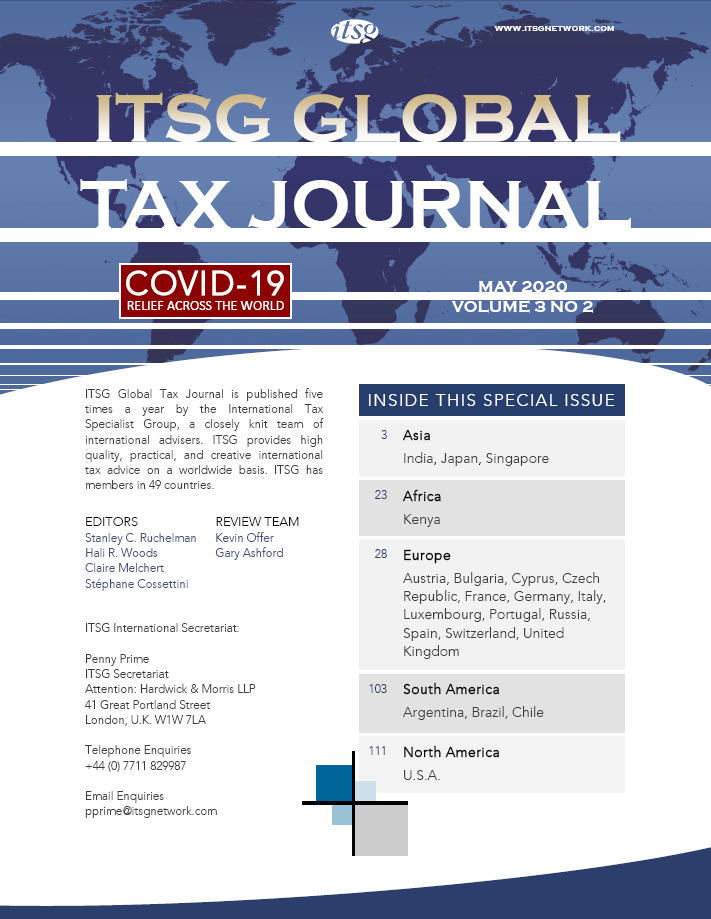As a result of the global health crisis caused by COVID-19, the Spanish government declared the state of alert on 14 March 2020. Since the declaration, different tax and legal measures have been adopted both by the Government and by the Autonomous Communities, in order to help parties most affected by this crisis, including workers and companies.
As a result of the constantly evolving situation of the health crisis, the legal and tax measures implemented by the Spanish Government are subject to continuous amendments. Furthermore, it is expected that most of the measures will be called off once the state of alert is over.
It is important to highlight that due to the characteristics of the Spanish legal system, many Autonomous Communities and Councils have also approved complementary support measures for workers and companies.
TAX DEFERRAL
Firstly, the Spanish Government has approved an automatic deferral for payment and filing of the first quarter of 2020 tax returns until 20 May 2020. The benefit of deferral is available to businesses, including companies and self-employed individuals, whose turnover in 2019 was less than €600,000. The taxes that qualify for the automatic deferral are V.A.T., first advance of corporate tax, and withholding tax on employees and professionals’ income.
Secondly, the Spanish Government has granted the option of requesting for tax deferrals beyond 20 May 2020. Companies and self-employed individuals whose turnover in 2019 was less than €6,010,121.04 are entitled to benefit from it. These tax deferrals may be implemented until 20 November 2020. While no interest will be imposed on the late payment for the first quarter, an interest rate of 3.75% will be charged for the following period. The benefit of tax deferral for an amount of up to €30,000 can be claimed without providing a guarantee or collateral by the taxpayer.
EXTENSION OF DEADLINES IN TAX AND LEGAL PROCEEDINGS
The tax deadlines for tax assessments that initiated before the state of alert have been extended to the later of April 30, 2020 or the end of the state of alert. In particular:
- Deadlines for paying tax debts issued and notified by the Spanish tax authorities.
- Deadlines related to request of taxpayer’s information by the tax authorities.
- Deadlines for filing appeals and administrative claims.
Furthermore, this elapsed time during the duration of the state of alert would not be included for the purpose of determining the maximum length of any procedures for application of taxes, penalties or appeals carried out by the Spanish tax authorities. Likewise, all statute of limitations periods related to any action or right included in the domestic tax rules are suspended.
Similarly, for judicial procedures (except for urgent actions, like protection of fundamental rights and freedoms), the procedural deadlines have been suspended.
LABOUR MEASURES
In the labour area, Spanish Government has established that force majeure will be deemed to exist when a suspension or reduction in an employee’s working hours is a direct consequence of COVID-19. In particular, force majeure exists in the following cases:
- When the closure of a business activity (because there are places with public affluence) has been decreed by the government.
- When there are shortcomings related to urban mobility.
- When there is a lack of supplies.
- When there is a risk of contagion in the workforce.
The existence of force majeure must be established by the labour authority of the E.R.T.E. (temporary layoff procedures). It must involve legal representatives of the workforce. Also, during the period in which force majeure exists, neither the workers are required to work nor the employer is obligated to pay wages. However, the workers affected would obtain a subsidy from the Spanish Government, during the qualifying period.
Also, where possible, taking into account the characteristics of the business activity and the equipment at its disposal, the company must adopt measures that enable teleworking. Further, employees may adapt or reduce their working hours. An employee may adapt by adjusting the work schedule, changing the workplace or opting to telework. As an alternative, an employee may reduce the working hours by up to 100% with a proportional reduction in the salary.
COMPANY MEASURES
In addition to several tax deferrals and temporary employment relief procedures, Spanish companies are entitled to the following tax and legal relief measures if their 2019 turnover did not exceed €6 million.
Firstly, companies may be able to determine its first 2020 advance corporate tax payment based on the first quarter profits and losses instead of determining it in accordance with previous year tax benefit.
Secondly, companies with less than €8 million turnover and self-employed individuals whose activities have been interrupted or reduced by at least 75%, may request a deferral for the payment of their rental fees. The deferral will be determined based on the number of properties owned by the landlord:
- If the landlord has more than 10 properties, the tenant can request a rent deferral for up to four months.
- If the landlord has less than 10 properties, the tenant can request the use of the security deposit paid at the time of execution of the contract to pay the rent.
SELF-EMPLOYED INDIVIDUALS MEASURES
Spanish government subsidies have been approved for self-employed individuals who do not have any outstanding debt with Social Security and whose activities have been interrupted as a result of the measures adopted by the Government or have suffered a 75% decrease in their turnover. The qualified self-employed individuals can request for an unemployment payment from the Spanish Social Security. The final amount will be determined based on their Social Security contributions, however, will not be less than €661. Furthermore, while the state of alert lasts, the self-employed individuals will not be required to pay their monthly social security contributions. They can also request for a rental deferral on the same terms as companies. Moreover, the self-employed individuals, who normally pay taxes in accordance with a standardized method, are allowed to pay quarterly taxes based on the profit and less approach.
FLEXIBILITY OF CORPORATE RULES
In the corporate field, measures related to the submission of company annual accounts and related compulsory company books have been also adopted.
The deadline for drafting the annual financial statements by the Board of Directors has been extended to three months after the date of the end of the alert state. The new deadline for the final approval of the annual accounts in the General Shareholders Meeting is three months from the end of the period for drawing the accounts. In the case of listed companies, the period to hold the general shareholder´s meeting has been extended until 30 October 2020. Further, the due date for legalizing company accountancy books and the minutes of the company management bodies has also been extended to four months from the end of the state of alert. Finally, companies required to get their financial accounts audited by an independent expert must do so within two months from the date of the end of the state of alert.
OTHER MEASURES
Pension plan investors are allowed to receive their vested rights if certain requirements are fulfilled. In this regard, unemployed individuals by means of a layoff procedure and self-employed individuals who have ceased operations as a result of the public health crisis will be able to receive their pension vested rights.
Finally, the Spanish Official Credit Institute (I.C.O.) has approved loans that are eligible to be granted to self-employed individuals and companies affected by COVID-19 provided they didn’t already have outstanding debts with the Spanish Administration before the alert state. Thus, said loans and renewals conceded by financial institutions to companies and self-employed individuals would be guaranteed by the Spanish above-mentioned institution.

 Login
Login




















































